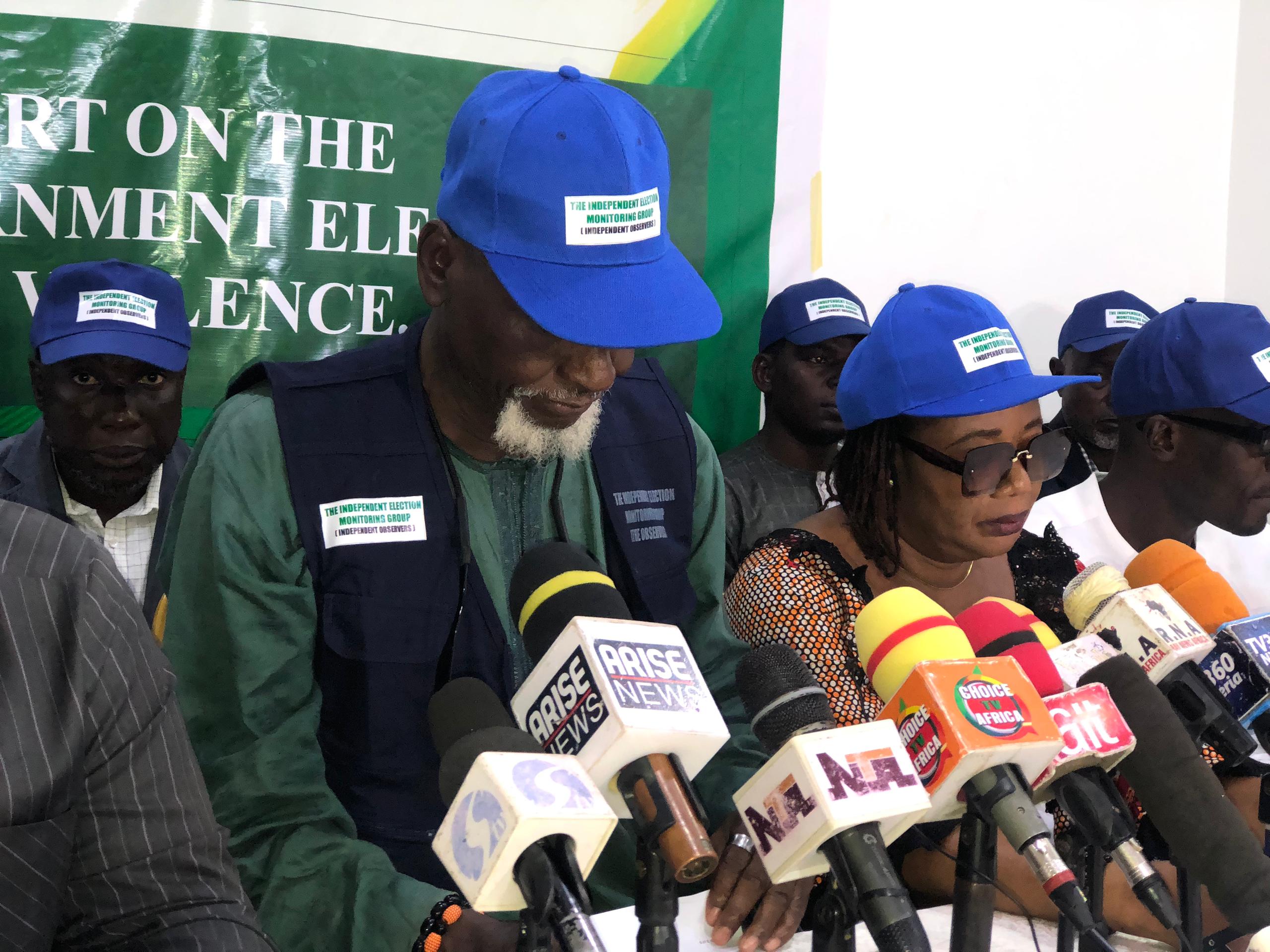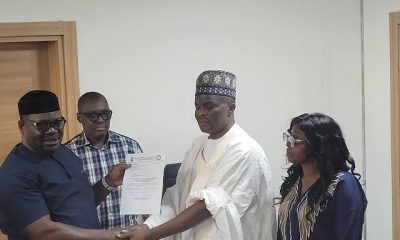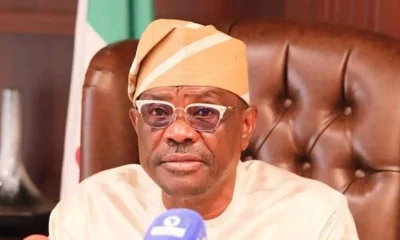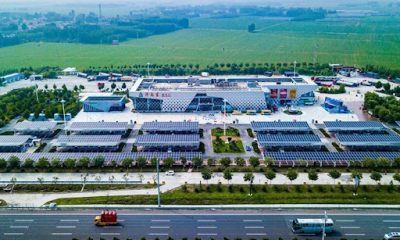Uncategorized
CBN Governor , Godwin Emefiele Breaking New Grounds

By Rev Solomon Semaka
In 2015, when Muhammadu Buhari assumed office as the president of the Federal Republic of Nigeria, he came with a lot of enthusiasm and that messianic wand to change the story of Nigeria that was on the verge of collapsing especially economically.
As a new sheriff in town, President Buhari made a lot of administrative changes, dissolved many boards and many heads of agencies and public service institutions that were not worth their unions were sacked or relieved of their appointments. This was done to take the country back on track towards economic recovery and prosperity.
However, one of the few places that the head was not changed was the apex monetary authority; the Central Bank of Nigeria otherwise known as CBN where a thoroughly bred economist, a financial expert and reputable banker, Godwin Emefiele was holding fort as the Governor having been appointed by the previous administration of Jonathan Goodluck on June 4, 2014.
For the Governor of the Central Bank, Godwin Emefiele to have gained the confidence of President Buhari, it is therefore, unambiguously an indication that he was doing something spectacularly different that worthily fitted into the change mantra of the current led administration. For instance, during his first term, he supervised an interventionist currency policy at the behest of the presidency, propping up the Nigerian naira by pumping billions of dollars into the foreign exchange market. He also introduced a multiple exchange rate regime to try to make pressure on the naira and avoid series of devaluations.
It is also pertinent to highlight unequivocally that the Central Bank under the watchful financial conscious eyes of the Governor; Godwin Emefiele has also taken the cashless policy in Nigeria to an unprecedented level.
For the avoidance of doubt, the Central Bank developed the cashless policy in 2012, which required a daily total limit of N500, 000 and N3,000,000 on free cash withdrawals across all accounts owned by individual and corporate customers respectively. The pilot was run in Lagos state from January 2012 while the policy took effect in Rivers, Anambra, Abia, Kano, Ogun and Federal Capital Territory (FCT) on July 1, 2013. The policy was implemented nationwide on July 1, 2014 a few days Godwin Emefiele assumed responsibility as the Governor of Bank.
Before the introduction and implementation of the cashless policy in Nigeria, Bussiness Day had noted that “the ease of cash flow occasioned by the cash-based economy made Nigeria vulnerable to fraud, terrorism, and crime. Armed robbers attacked bullion vans and customers who carried large sum of cash. Apart from that, the central bank spends billions of naira to remove and replace dirty notes in circulation”.
In other to effectively entrench the new cashless regime in the 6 states and the FCT, the Central Bank under Emefiele licensed 26 Mobile Money Operators, 10 Super Agents, 21 Payment Terminal Service Providers, 21 Payment Solution Service Providers, 4 Third Party Processors, 9 Switches and 5 non-Bank Acquirers. It is expected that these licensed entities will smoothen the implementation of the Cashless Policy across the Payments System.
Taking a careful look at the achievements of the cashless policy, Bussiness Day reports that “as evidenced by the NIBSS second-quarter fraud report of 2019, attempted fraud volume decreased by 47.28 percent from Q1 figures, while Web, ATM and Mobile remain the usual suspects to be used by fraudsters”.
“Okojere noted the growth in the volume of transactions that occurred in 2012 against 2018, following the Cashless Policy re-introduction and increase in usage of electronic transactions”.
Consequently, transactions on instant payments grew from 4 million in 2012 to 729m in 2018, transactions on PoS from 2.5 million in 2012 to 285 million in 2018, and transactions on Mobile Inter-Scheme grew from 2,200 in 2012 to 15 million in 2018”.
One of the areas that the administration of President Buhari will be fondly remembered even by generations yet unborn is the agricultural revolution. The peak of its commitment was the directive by the president to the Central Bank on August 13, 2019 not to make foreign currency available to fund food imports.
Otherwise, according to Emefiele in an interview with TBY in 2018 stated categorically that “four commodities—rice, fish, sugar, and wheat—make up nearly NGN1.3 trillion (USD3.6 billion) annually in import bills. These and other commodities on the 41 items list are a drain on our FX reserves. Our proclivity for imports has enriched other countries and impoverished ours. We cannot depend on other countries for food; that exposes us to unquantifiable social and economic vulnerabilities. If we increase domestic food production, we will create jobs, reduce poverty, and shield our economy from foreign impulses”.
“Thus, the CBN is channeling a great deal of development finance and interventions towards agriculture to ensure sufficiency in the production of food and raw materials through our various development finance mechanisms and schemes. Our intention is to ensure that Nigeria does not depend on other countries for most of the things we consume. We must ensure that our non-oil current account balances stand hugely positive”.
“On this note, the Anchor Borrowers’ Program (ABP) has recorded spectacular success, especially with regard to rice production. As we speak, rice production has increased several-fold. Kebbi State alone is expected to produce over 2 million metric tons of rice annually, while employees at Labana Rice Mills seek to keep pace with demand, processing 320 tons of rice a day, a 250% increase from the previous year. Therefore, we have seen sharp drop in rice imports that translates to a significant reduction in rice import bills, saving us over USD600 million in 2016 alone”.
An interesting thing about Godwin Emefiele is that since the return of democracy in Nigeria in 1999, he is the first governor of the Central Bank of Nigeria to serve a second term in office. The senate of the Federal Republic of Nigeria while screening him for a second term in office in May 2019 through its chairman on Banking, Finance, and other Financial Institutions, Rafiu Ibarahim said the committee was impressed with Mr Emefiele’s more than 32 years’ experience with outstanding performance.
The committee recommended confirmation of Mr Emefiele based on performance in his first tenure. “That the nominee understands the diverse economy of the country and has displayed profound knowledge of the continuous existence of our economy stability. That the nominee has performed credibly in his first tenure which resulted to the exit of the nation out of economic recession”, Mr Ibrahim said. His confirmation was put to voice vote and received a unanimous ‘ayes’ from the senators, reports Premium Times on May 16, 2019.
Consequent upon his confirmation and reappointment for a second term in office, Emefiele the CBN governor unveiled his policy thrust for the next five years. Although the policy document outlines a number of objectives, the most important ones include
a) the aim to achieve double-digit GDP growth in the next five years,
b) bringing down inflation to single-digits
c) improving the payment systems infrastructure and driving financial inclusion to 95% by 2024,
d) maintaining the existing exchange-rate policy regime of a managed float and
e) recapitalisation of the banking industry.
In order to cushion the effect on the Covid-19 pandemic on the Nigerian economy and to ameliorate the sufferings of the poor masses, the Buhari led administration through the Central Bank introduced a N50 billion Targeted Credit Facility as a stimulus package to support households and micro, small and medium enterprises that are affected by the coronavirus pandemic.
This was part of measures and policies aimed at making sure that Nigeria’s economy does not slip back into recession due to the coronavirus pandemic and low oil prices.
The Central Bank of Nigeria (CBN) has so far announced the disbursement of over N49 billion out of N50 billion targeted facility for households and small businesses to over 80,000 families and households.
In addition, healthcare facility operators also benefitted from a N100 billion intervention fund and another N1 trillion fund for the manufacturing sector and is aimed at ensuring that productivity is enhanced, thereby working a way out of the impact of this pandemic.
It is very important to point out that there are many other areas that the Central Bank of Nigeria under the leadership of Godwin Emefiele as the governor has done creditably well to save the Nigerian economy from slipping into recession, the above mentioned are just but the tip of an iceberg.
Therefore, it is imperative to call the President Muhammadu Buhari led administration not to relent in its efforts in supporting Emefiele in the discharge of his onerous duties so as to make the Nigerian economy viable, dependable, sustainable, reliable and strong.
Semaka is a public affairs commentator and Convener of Save Nigeria Movement.

Uncategorized
Form I-130 Approved: A Step-by-Step Guide to the Next Stages
Obtaining approval of Form I-130, Petition for Alien Relative is one of the key milestones in the immigration process. It unveils the process of the next moves in order to bring your loved one to the United States of America. Perhaps they are in the United States or perhaps they are in another country. It is crucial to know what comes next. Alright, let’s define the most crucial questions you may have.
What to do after Form I-130 is approved
It takes several months, after which USCIS will send you a notice that your Form I-130 has been approved. In case your relative resides in another country other than the United States the case will be taken to the National Visa Center (NVC). If they are in the U.S, whether to apply for adjustment of status or to go through consular processing is the next step to be taken.
All the applicants apart from those in the USA will have their case numbers allocated to them by the NVC together with instructions. This encompasses paying fees and completing the form I-130 Petition alien relative and the DS-260 form called the Immigrant Visa and Alien Registration Application. It is important that you be responsive to emails, at least to the official ones to check for updates.
If your relative is in the U.S., you will proceed filing Form I-485, Application to Register Permanent Residence or Adjust Status.
How to apply for Adjustment of Status if you are in the US
Adjustment of Status (AOS) enables Your Relative to get an LPR status without having to travel out of the country. Here’s how to navigate this process:
- Check Eligibility: This should guarantee that the beneficiary is in the United States legally and meets all the requirements of the program.
- File form I-485: Complete and file Form I-485 (Application to Register Permanent Residence or Adjust Status) which is used in changing of immigration status to that of a permanent resident. A general rule of thumb to reduce delay as much as possible is to lay as much accuracy as possible from the onset of the project.
- Gather Required Documents: Most organizations require that you submit some documents Among the documents include:
- Form I-130 approval notice.
- Passport and current visas.
- The form with the name Arrival/Departure Record, also known as I-94.
- Two passport-style photos.
- The results of the medical examination are contained in form I-693.
- Evidence of a relationship with the U.S. citizen or a permanent resident.
- Pay the Fees: The costs associated with a Form I-485 depend on the applicant’s age and other factors of his/her personal situation. Make sure you submit your application with the right fee.
- Attend the Biometrics Appointment: Applicants are required to submit the application and after some time, USCIS will reschedule for fingerprint and photos to be taken. Attendance is crucial.
- Prepare for the Interview: Nevertheless, most applicants will have to go for an interview at a local office of the USCIS. Check your application and gather whatever proof to support your case that you can.
How to apply for consular processing if you are outside the US
For the beneficiaries residing in other countries they then undergo consular processing. Here’s how to handle this process:
- Wait for NVC Notification: Once the I-130 has been approved you will be contacted with a case number and additional directives from NVC.
- Pay Fees and Submit DS-260: When the applicant receives a case number, they should then process the immigrant visa processing fees and fill the Form DS-260.
- Gather Supporting Documents: Gather different documents in order of, barring the letters:
- Your passport, which must be valid for at least six months of the intended stay.
- Birth certificate.
- Police certificates.
- Medical examination results.
- Affidavit of Support or the specific form used for it is I-864.
- Attend the Visa Interview: The last stage is the Visa interview that takes place at a US embassy or a consulate. They should not lie, and they should be ready or willing to answer questions about their relationship and their background.
- Receive Your Visa: When granted you get a stamp on your passport through which you can be able to travel to the United States of America.
It is often not easy to know what to do after Form I-130 has been approved, however it’s important to be informed and organized. No matter whether you are changing your status within the territory of the United States or opting for consular processing, it is important to know what steps to take in order to reach the desired end. The receipt of a green card. Be as organized as you can, keep record of the documents and when necessary, seek legal help. All the best on this great adventure that lies ahead of you!
Uncategorized
Awe Progressive Group Urges Gov. Sule to Consider Hamza Moyi for LGA Chairmanship
From Leo Zwànke, Lafia
Awe Local Government Area Progressive Group has called on the Governor of Nasarawa State, Engineer Abdullahi Sule, to consider Hon. Hamza Ibrahim Moyi for the position of Chairman of the Awe Local Government Council. This appeal comes as the governor and the All Progressives Congress (APC) State Working Committee are set to decide on the candidate for the chairmanship post.
In a press release signed by the group’s spokesperson, Muhammed Musa on Saturday and sent to journalist, the group highlighted Moyi’s contributions to the development of Awe Local Government Area in his capacity as the Senior Special Assistant (SSA) to the governor on Sports. According to Musa, Moyi’s name is among the three submitted for consideration by the governor.
The statement commended Moyi’s dedication to the local government, particularly in areas such as security, education, healthcare, agriculture, and infrastructural development. The group believes that his track record makes him the best fit for the position of council chairman.
“Hon. Hamza Ibrahim Moyi has worked tirelessly as the SSA to the governor, ensuring that Awe Local Government remains secure and that development projects are carried out effectively. His efforts in the areas of education, health, and agriculture have had a direct and positive impact on the people of the local government,” the statement read.
The group further emphasized that Moyi’s leadership has played a pivotal role in fostering peace and stability within the local government, particularly in addressing security challenges that have affected the area in the past.
“We appeal to His Excellency, Governor Abdullahi Sule, to recognize the efforts of Hon. Moyi and give him the opportunity to serve as the Chairman of Awe Local Government Council. His experience, dedication, and commitment to the progress of our local government make him the ideal candidate for this position,” the statement added.
The group expressed confidence that Moyi’s leadership would bring further development to Awe LGA and strengthen its role within the state.
The decision on the chairmanship is expected to be made soon as political activities in Nasarawa State gear up ahead of the local government council elections.
Uncategorized
Rivers LG Polls: Observers Blame Gov Fubara’s Use Of Non-State Actors for Post-Election Violence ***Exonerate Police of Any Wrongdoing Independent observers have condemned the violence and arson that marred the Rivers State local government elections, blaming Governor Siminalayi Fubara’s supporters for the chaos. The Independent Election Monitoring Group, in its preliminary report, cited widespread irregularities, including the lack of election materials, non-use of electoral registers, and dubious declaration of results. Speaking at a press conference, Executive Director, Dr. Emmanuel Agabi, said Governor Fubara’s insistence on conducting the elections despite court rulings and security concerns has been criticized as a desperate bid to consolidate power. Notably, the report cleared the Nigerian Police of any wrongdoing, highlighting their withdrawal from the election due to a Federal High Court ruling. The report recommends a full investigation into the arson attacks, nullification of election results, deployment of federal security forces, and dialogue between the governor and opposition parties. According to the report, the use of violence by Fubara’s supporters in the wake of the election reflects the Governor’s desperation to suppress opposition and maintain control of the political narrative. By allowing his supporters to engage in such acts of violence, it added that Fubara has contributed to the breakdown of law and order in Rivers State. “The Rivers State local government elections and the subsequent acts of arson represent a low point in the state’s political history,” the report said. “Obviously , the state local government elections have exposed the fragility of the democratic process in the state. “Governor Siminalayi Fubara’s determination to consolidate political power through the Action Peoples Party (APP) and disregard for legal rulings has led to a crisis that threatens both the democratic fabric of Rivers State and the security of its citizens. “The refusal to honor court rulings, combined with the manipulation of electoral processes and violent suppression of opposition, demonstrates a clear disregard for the rule of law. “It is evident that Governor Fubara’s supporters, driven by his desperation to build and secure a political stronghold, are responsible for the violence and destruction that followed the elections. “The state’s political crisis will only worsen if urgent steps are not taken to restore order, accountability, and respect for democratic principles. “The use of arson as a tool for political intimidation is not only reprehensible but dangerous, as it has the potential to escalate into broader conflict. If unchecked, this pattern of governance could erode what remains of democratic practice in Rivers State. “It is therefore imperative that Governor Fubara and his administration give peace a chance by embracing dialogue, respecting court rulings, and adhering to democratic norms. “The Governor must realize that power, when pursued at the expense of the people’s trust and the rule of law, is unsustainable. “For the future of Rivers State, and indeed Nigeria’s democratic experiment, it is crucial that stakeholders at all levels work together to address the deep-seated issues that have emerged from this election. “This includes reforming the electoral system, ensuring accountability for violent actions, and fostering a political culture where power is gained through the people’s will, not through coercion, manipulation, or violence. “In the words of former President Goodluck Jonathan, the political crisis in Rivers State is reminiscent of the crisis in the old Western region. It is a warning sign of what could become a larger national issue if the political situation in Rivers State is not addressed. “It is the responsibility of all concerned parties, including the federal government, to intervene and ensure that Rivers State does not spiral into anarchy. Only through collective action can the state be returned to peace, stability, and genuine democratic governance.”

***Exonerate Police of Any Wrongdoing
Independent observers have condemned the violence and arson that marred the Rivers State local government elections, blaming Governor Siminalayi Fubara’s supporters for the chaos.
The Independent Election Monitoring Group, in its preliminary report, cited widespread irregularities, including the lack of election materials, non-use of electoral registers, and dubious declaration of results.
Speaking at a press conference, Executive Director, Dr. Emmanuel Agabi, said Governor Fubara’s insistence on conducting the elections despite court rulings and security concerns has been criticized as a desperate bid to consolidate power.
Notably, the report cleared the Nigerian Police of any wrongdoing, highlighting their withdrawal from the election due to a Federal High Court ruling.
The report recommends a full investigation into the arson attacks, nullification of election results, deployment of federal security forces, and dialogue between the governor and opposition parties.
According to the report, the use of violence by Fubara’s supporters in the wake of the election reflects the Governor’s desperation to suppress opposition and maintain control of the political narrative.
By allowing his supporters to engage in such acts of violence, it added that Fubara has contributed to the breakdown of law and order in Rivers State.
“The Rivers State local government elections and the subsequent acts of arson represent a low point in the state’s political history,” the report said.
“Obviously , the state local government elections have exposed the fragility of the democratic process in the state.
“Governor Siminalayi Fubara’s determination to consolidate political power through the Action Peoples Party (APP) and disregard for legal rulings has led to a crisis that threatens both the democratic fabric of Rivers State and the security of its citizens.
“The refusal to honor court rulings, combined with the manipulation of electoral processes and violent suppression of opposition, demonstrates a clear disregard for the rule of law.
“It is evident that Governor Fubara’s supporters, driven by his desperation to build and secure a political stronghold, are responsible for the violence and destruction that followed the elections.
“The state’s political crisis will only worsen if urgent steps are not taken to restore order, accountability, and respect for democratic principles.
“The use of arson as a tool for political intimidation is not only reprehensible but dangerous, as it has the potential to escalate into broader conflict. If unchecked, this pattern of governance could erode what remains of democratic practice in Rivers State.
“It is therefore imperative that Governor Fubara and his administration give peace a chance by embracing dialogue, respecting court rulings, and adhering to democratic norms.
“The Governor must realize that power, when pursued at the expense of the people’s trust and the rule of law, is unsustainable.
“For the future of Rivers State, and indeed Nigeria’s democratic experiment, it is crucial that stakeholders at all levels work together to address the deep-seated issues that have emerged from this election.
“This includes reforming the electoral system, ensuring accountability for violent actions, and fostering a political culture where power is gained through the people’s will, not through coercion, manipulation, or violence.
“In the words of former President Goodluck Jonathan, the political crisis in Rivers State is reminiscent of the crisis in the old Western region. It is a warning sign of what could become a larger national issue if the political situation in Rivers State is not addressed.
“It is the responsibility of all concerned parties, including the federal government, to intervene and ensure that Rivers State does not spiral into anarchy. Only through collective action can the state be returned to peace, stability, and genuine democratic governance.”
-

 Business14 hours ago
Business14 hours agoOkpella Monarch: Obaseki Ratified Kingmakers Decision, End 5years leadership Vacuum
-

 Banking10 hours ago
Banking10 hours agoFree Food Saga: Akpabio quoted out of context-CSO
-

 Foreign15 hours ago
Foreign15 hours agoSci-tech innovation fuels China’s high-quality development
-

 Entertainment7 hours ago
Entertainment7 hours agoDavido Declares ‘Timeless’ His Best Album
-

 Entertainment7 hours ago
Entertainment7 hours ago‘Adire’ Secures Four Nominations at the Best of Nollywood Awards
-

 Business7 hours ago
Business7 hours agoWike Urges Nigerians to Pay Taxes for Improved Social Services
-

 Foreign9 hours ago
Foreign9 hours agoQinling Mountains better safeguarded with comprehensive digital platform
-

 Foreign9 hours ago
Foreign9 hours agoExpressway service station in Shandong achieves carbon neutrality





